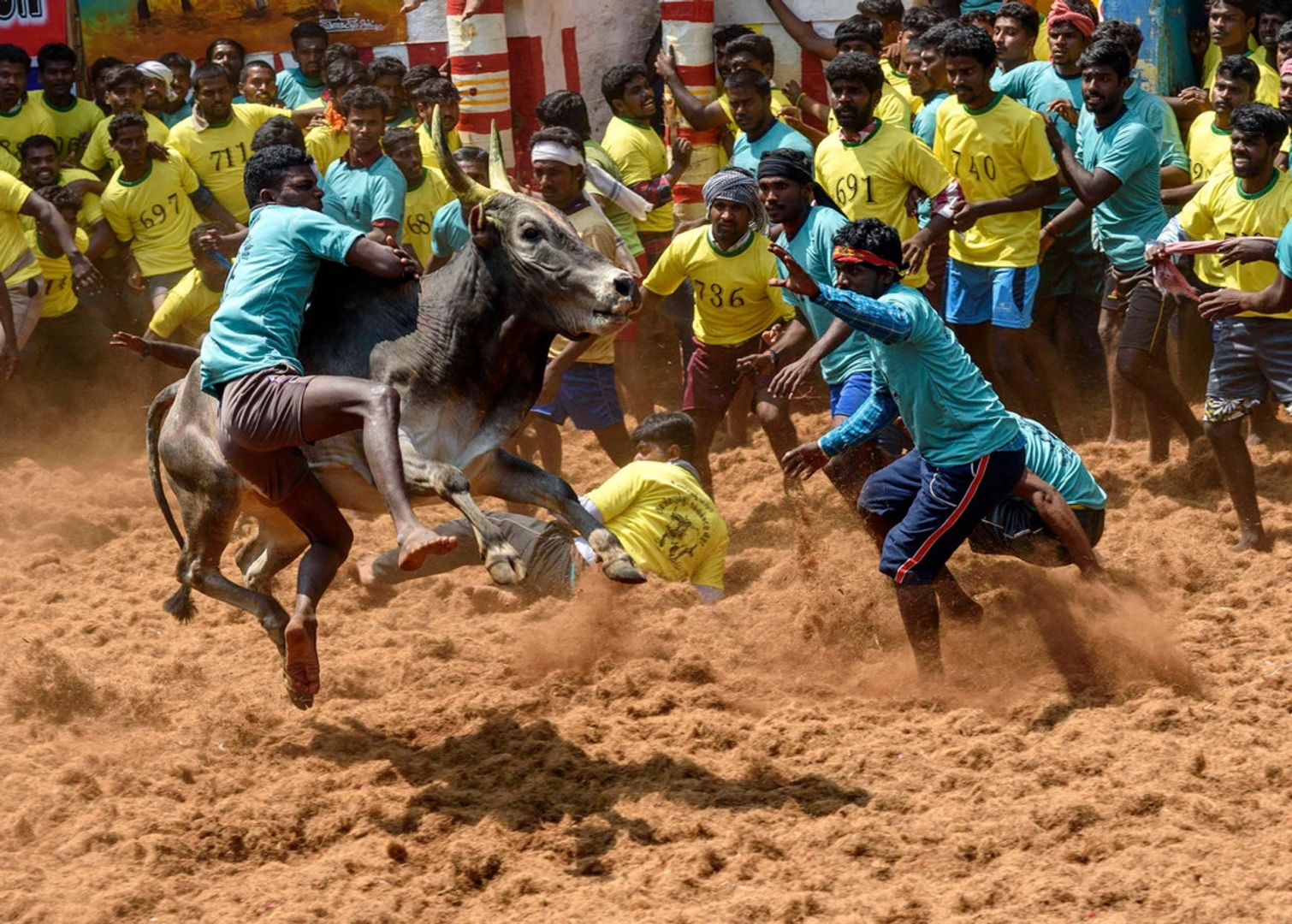
While delivering its verdict for a batch of pleas challenging Tamil Nadu and Maharashtra laws allowing the traditional bull-taming sport Jallikattu, the Supreme Court upheld the validity of the laws.
The Supreme Court said the states' Acts are legally valid, adding, “It is a cultural heritage borne out by texts and evidence.” A five-judge Constitution bench comprising Justice KM Joseph, Justice Ajay Rastogi, Justice Aniruddha Bose, Justice Hrishikesh Roy and Justice CT Ravikumar pronounced the verdict.
As per the cause list published on the Supreme Court’s website, a single judgement was pronounced by Justice Aniruddha Bose.
Here’s a look at how the entire issue around the popular sport ensued.
Jallikattu, also known as “Eruthazhuvuthal”, is a bull-taming sport played in Tamil Nadu as part of the Pongal harvest festival.
In 2014, upholding animal rights and pointing out the "untold cruelty" the bovines are subjected to, the Supreme Court banned bulls for Jallikattu events organised in Tamil Nadu and neighbouring states.
A year later, in 2015, the Supreme Court also dismissed the Tamil Nadu government’s plea seeking recall of its verdict banning the bull-fights, holding that the practice amounted to cruelty to the animals.
Dismissing the government's plea, the bench of Justice Dipak Misra and Justice Rohinton Fali Nariman brushed aside the state government's argument that the 3,500-year-old tradition was rooted in religion.
Later, the Ministry of Environment put out a notice allowing Jallikattu. There were, however, a few guidelines added to regulate the sports. Despite the guidelines, the Supreme Court put a stay on the Centre’s notification.
WHY IS IT SO CONTROVERSIAL?
The sport has taken flak from animal rights activists for its treatment of bulls.
According to Deccan Chronicle, People for the Ethical Treatment of Animals (PETA) and Federation of India Animal Protection Agencies (FIAPA) have been calling for the sport to be banned since 2004.
As Supreme Court lawyer Anjali Sharma told The Guardian, “There are many alleged cultural practices which have been outlawed by courts.
Sharma, a member of the Animal Welfare Board of India (AWBI), added, “For instance, child marriage has been outlawed. Sati is not permitted by the law. We have a constitution, and all laws have to adhere to its norms.”
Sharma said observers appointed by courts had recorded bulls being plied with alcohol or even had chilli powder flung in their faces.
“Legally an animal cannot be forced to do something that does not come naturally to it,” she added.
“Horses enjoy running; bulls do not. They are draught and pack animals, that are largely peaceful, and to get them to run you have to goad them. That can only be done by prodding it, poking it, twisting its tail or administering alcohol.”
Nikunj Sharma of PETA India said the event leads to deaths for both people and the bulls.
“Our major focus is to make people aware that these games are not just cruel for animals but they are also cruel for humans,” Sharma said.
But others disagree.
“Jallikattu and bulls are like God to us,” said M Jayakumar, who was taking part in an event in the village of Allanganallur. “Even if we get injured while performing the sport we make sure not to harm the bulls.”
Another cause for concern is the number of deaths resulting from the sport – and not just to the tamers.
Bulls often gore bystanders as they escape through the crowded areas.
According to The Guardian, at least 1,100 people have been killed in the sport since 2010.
The Animal Welfare Board says at least 43 people died and thousands more injured between 2008 and 2014, as per The Hindu.
The non-profit Elsa Foundation has pegged the number of deaths since 2017 at 102 people and 20 bulls.
These include 81 spectators and passers-by, 21 bull tamers and ‘a large number’ of schoolchildren.
TAMIL NADU ASSEMBLY PASSES BILL
The Tamil Nadu Assembly, in 2017, passed a bill replacing an ordinance for conducting the bull-taming sport.
The "Prevention of Cruelty to Animals (Tamil Nadu Amendment) Act 2017", piloted by then Chief Minister O Panneerselvam, was passed by voice vote with the support of Opposition DMK and other parties. It said the "Government of Tamil Nadu has decided to exempt Jallikattu from the provisions of the Prevention of Cruelty to Animals Act."
PETITIONS CHALLENGING THE BILL
The Animal Welfare Board of India (AWBI) and the Compassion Unlimited Plus Action (CUPA) filed some petitions, challenging the amendment to the Prevention of Cruelty to Animal Act passed by the Tamil Nadu Assembly.
The Supreme Court, hearing those petitions, refused to stay the new Jallikattu law passed by the Assembly but slammed the state government for not following the law and order.
MATTER TRANSFERRED TO LARGER BENCH
In 2018, a bench of Chief Justice Dipak Misra and Justice RF Nariman said the petitions challenging the Prevention of Cruelty to Animals (Tamil Nadu Amendment) Act, 2017, needed to be decided by a larger bench since they involved substantial questions relating to the interpretation of the Constitution.
The bench framed five questions to be adjudicated upon by the larger bench.
The top court had said that notwithstanding the cruelty involved in “Jallikattu”, it cannot be termed a blood sport as nobody is using any weapon, and the blood may only be an incidental thing.
It had said though cruelty may be involved in the sport, people do not take part in the event to kill the animal.
Parties in the case are the Animal Welfare Board, PETA, CUPA, Federation Of Indian Animal Protection Organisations and Animal Equality, Union of India and the State of Tamil Nadu.
Solicitor General Tushar Mehta represented the Centre in the matter, while Senior Advocate Kapil Sibal and Rakesh Dwivedi represented the Tamil Nadu government.